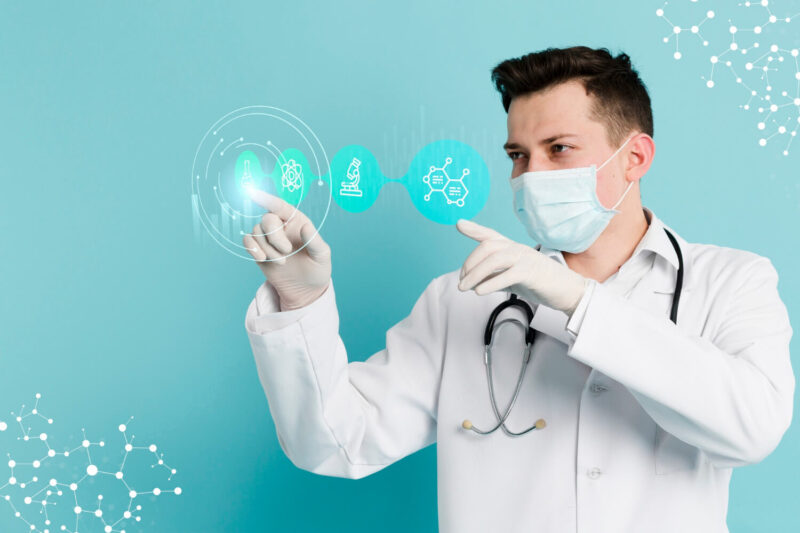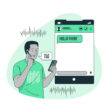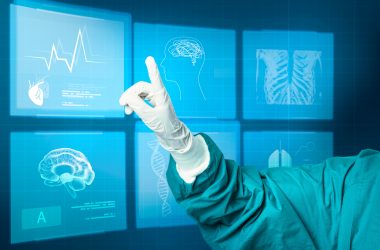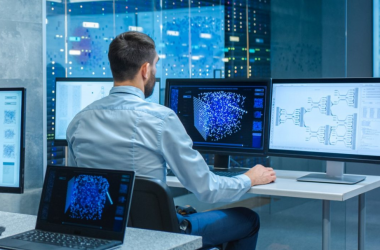One of the most challenging dilemmas confronting the healthcare industry is managing multiple patients simultaneously. It’s not uncommon for doctors to face situations where several emergencies demand their attention all at once.
This problem becomes even more daunting when each patient requires immediate care. But with AI for patient monitoring in healthcare, things get easier. It helps keep track of each patient on its own, connecting them with a doctor or providing medicine instantly when needed.
On top of that, AI also sifts through patient data and medical records to create personalized treatment plans and medication schedules. This approach ensures that each patient receives the most effective care based on their needs.
In this blog, we’ll discuss how AI healthcare solutions are changing patient monitoring and management in healthcare, improving the delivery of quality care to patients.
What Is Remote Patient Monitoring (RPM)?
Remote patient monitoring, also known as RPM, is a technology that allows healthcare providers to monitor patients outside of the traditional clinical setting.
Digital technologies such as AI wearable devices and mobile health apps collect and transmit patient data to healthcare professionals to monitor patients outside of hospitals.
The collected data is transmitted wirelessly to healthcare providers for analysis and intervention when necessary. Here are some critical aspects of RPM.
- Data collection: It uses tools like blood pressure cuffs, glucometers, pulse oximeters, and wearable devices like smartwatches. These gadgets help collect important health information such as vital signs, blood sugar, activity levels, and other relevant data.
- Data transmission: The gathered data is securely transmitted wirelessly. This is often done through Bluetooth or cellular connections to a secure platform accessible by healthcare providers.
- Data analysis and intervention: Healthcare providers use the data collected to track patients’ health, spot problems early, and adjust treatments to keep them healthy.
Reasons to Use AI Healthcare Solutions For Patient Monitoring
Patient monitoring has made significant progress in different areas of healthcare. It detects severe health issues early and enables proactive interventions to prevent their worsening.
AI identifies patterns and trends in diseases humans might overlook, giving valuable insights into a patient’s health.
AI-powered chatbots have also become an integral part of healthcare technology. These chatbots for healthcare offer patients 24/7 access to information, answer basic questions, and schedule appointments, which helps lessen the workload on healthcare staff. Here are a few strong reasons to use AI for patient monitoring.
1. Upgraded Data Analysis and Early Detection
AI employs sophisticated algorithms to comprehend intricate patient data from remote monitoring. It then uncovers any patterns or diseases that human observation may have overlooked. Due to this early detection, doctors can promptly take action to prevent complications. For instance, if a person is diagnosed with late-stage cancer, urgent procedures may be necessary.
2. Personalized Care and Medication Adherence
Understanding each patient’s needs can be challenging in healthcare. That’s where AI for patient monitoring comes in—it manages past medical history to create personalized treatment plans and maintains medication schedules tailored to individual needs and medical conditions. AI healthcare solutions also send personalized reminders and motivational messages to patients, helping to boost medication adherence.
3. Predictive Analytics and Risk Stratification
AI uses predictive analytics to foresee potential health issues. By examining data from remote monitoring devices, AI can predict when a patient might experience a health crisis or develop a particular disease. This enables healthcare providers to intervene early and prevent further complications, leading to better patient outcomes and fewer hospital readmissions.
4. Timely Alerts and Improved Response Times
AI continuously monitors patient data and promptly alerts healthcare providers when critical changes occur, allowing for rapid intervention in emergencies.
Imagine AI detecting a sudden drop in heart rate and prompting healthcare professionals to act immediately. This could save crucial time and enhance patient outcomes.
5. Improved Patient Engagement and Self-Management
Today, AI-powered chatbots offer patients 24/7 access to information and support. They can answer basic questions and provide guidance. It empowers patients to take a more active role in their health management, increasing engagement and promoting self-care practices.
How AI-Powered Medical Imaging Is Driving Change in the Healthcare Industry
How AI Healthcare Solutions Assist in Patient Management
Patient management is not the same anymore because AI healthcare solutions are taking the lead in the industry. AI offers a wide range of tools and applications that make monitoring convenient and manageable.
To further understand how AI in patient management improves healthcare processes, here are a few of its examples:
1. Medical Image Analysis
AI algorithms make X-rays, MRIs, and CT scans more accurate. They make it easier for healthcare professionals to identify abnormalities or potential diseases before it’s too late.
Unlike before, when diagnoses would take days and weeks, AI healthcare solutions create an environment where earlier diagnoses are the reality and prompt treatment plans are not improbable anymore.
2. Personalized Medicine
Patient management is incomplete without the introduction of personalized medicine in their healthcare plan. And what better way to go about it than using AI?
AI can analyze large datasets of patients’ information, including but not limited to medical history and genetic information. With personalized plans for treatment, it only becomes a matter of time to get an individual the help they need.
3. Automated Tasks and Workflows
One of the most frustrating things about patient management for healthcare staff is the regular administrative tasks they have to deal with. With AI involved in patient management, all such tasks become automated.
Everything from scheduling appointments to managing patient records and generating reports becomes the responsibility of AI programs. Healthcare staff becomes free to do what they initially wanted—help people.
Applications of AI In Patient Monitoring
Now, you are aware of the multiple ways AI assists in patient management and monitoring. How about we take this a little further and prove how it actually helps out with AI applications in healthcare?
Let’s take a look at the best applications of AI for patient monitoring and management:
1. Early Detection of Complications
As mentioned in the previous section, early diagnoses are a real possibility with AI in patient monitoring. AI algorithms can record and analyze data from a number of healthcare devices. Every data point from wearable devices and sensors becomes vital in early detection.
Healthcare professionals can use these data points to establish a personalized baseline for each of their patients. Any deviation from the normal will alert the healthcare professional to take necessary action.
2. Proactive Intervention with Chatbots
It may sound like something that won’t be possible for another decade or so, no matter how fast AI technology is growing, but you would be surprised.
AI for patient monitoring is not part of the future plan for healthcare–it’s here, and it’s happening now! Especially with a healthcare chatbot, it is easier to ask patients about their symptoms and get an update on their overall well-being.
AI-powered chatbots can also help with the identification of early warning signs and offer tailored support to each patient.
3. Fall Detection and Prevention
Healthcare institutions have always been proactive about making healthcare more convenient for the elderly and individuals with increased fall risk. Now, AI makes it possible by offering the services of wearable devices to analyze movement patterns and detect potential risks.
In case a person is a fall risk, AI can prompt trigger alerts and get the help they need in record time. It’s a great application for emergency care and assistance all fall-risk patients need.
4. Mental Health Monitoring
The thought of monitoring mental health remotely is an acceptable and appreciated concept ever since the world went into lockdown and people needed mental help remotely.
With AI in mental health monitoring, it becomes easier to analyze speech and language patterns remotely, organize personalized interventions for a group of people, and much more. There also are some AI-powered apps that help track a patient’s mood using self-reported data.
Future Trends for Remote Patient Monitoring
Remote patient monitoring (RPM) has become a cornerstone of modern healthcare. It provides continuous monitoring, improves patient engagement, and facilitates cost-effective care delivery.
As technology and healthcare needs evolve, the future of RPM promises exciting advancements. These advancements will further revolutionize how we monitor and manage patient health remotely. Here is the breakdown of five key trends shaping the future of RPM.
1. The Rise of Centralized Virtual Care Hubs
AI healthcare solutions are evolving towards a more centralized and integrated approach. One significant development in RPM is the emergence of centralized virtual care hubs. These platforms serve as a single access point, easily combining virtual consultations, remote monitoring capabilities, and data visualization tools.
Benefit – This will create a one-stop shop for patients to manage their health remotely and lessen unnecessary hospital visits.
2. Continuous and Wearable-Driven Monitoring
Currently, most RPM technology focuses on measuring vital signs at specific times. The future AI for patient monitoring holds promise for continuous monitoring using advanced wearables and sensors.
Benefit – This continuous data stream will provide a more comprehensive picture of a patient’s health. And helps in the early detection of potential issues.
3. Expanding Virtual Care Accessibility
Despite financial constraints, the future of healthcare indicates a trend towards increased access to virtual care. This involves broader insurance coverage for RPM services and the creation of more affordable technology options.
Benefit – This expansion ensures remote monitoring benefits people from all backgrounds, promoting health equity and providing access to quality healthcare for everyone.
4. Prioritizing Data Security and Privacy
As remote patient monitoring collects more sensitive patient data, data security and privacy become top priorities. Advancements in data encryption and anonymization are crucial to build trust and keep patient information safe.
Benefit – Strong security measures protect patient privacy, build trust, and encourage wider use of RPM services, leading to better patient care and improved health outcomes.
Frequently Asked Questions (FAQs)
How Do AI Healthcare Solutions Improve Patient Monitoring?
AI healthcare solutions continuously monitor patient data and alert healthcare providers promptly for immediate intervention in critical situations. This has improved patient monitoring and provided round-the-clock access to information and support.
What Are the Key Features of AI-Powered Patient Management Systems?
The key features of AI-powered patient management systems include data analysis, personalized care plans, medication adherence support, risk prediction, and real-time alerts.
Can AI Assist in Real-Time Health Data Analysis?
AI algorithms operate on real-time data streams collected from sensors and digital devices. It helps to offer instant insights that enable prompt responses to crucial developments.
How Do AI Solutions Enhance Remote Patient Monitoring?
AI solutions enhance remote patient monitoring by analyzing data for early issue detection, personalizing care plans, predicting risks, and triggering timely alerts for healthcare providers.
What Are the Benefits of Integrating AI Into Healthcare Systems for Patient Care?
Integrating AI into healthcare systems enhances patient care. It offers early detection, improved medication adherence, proactive risk management, and faster response to critical events.

Dawood is a digital marketing pro and AI/ML enthusiast. His blogs on Folio3 AI are a blend of marketing and tech brilliance. Dawood’s knack for making AI engaging for users sets his content apart, offering a unique and insightful take on the dynamic intersection of marketing and cutting-edge technology.










